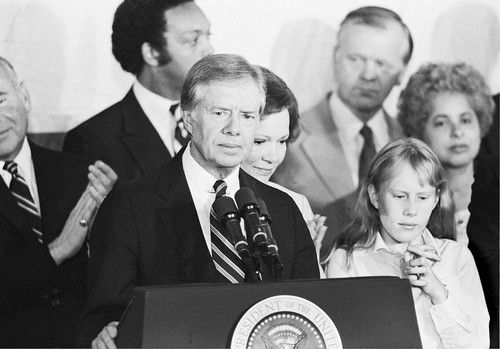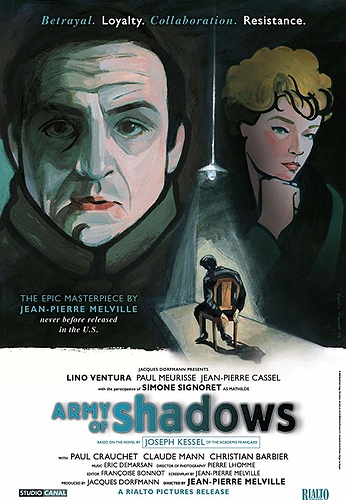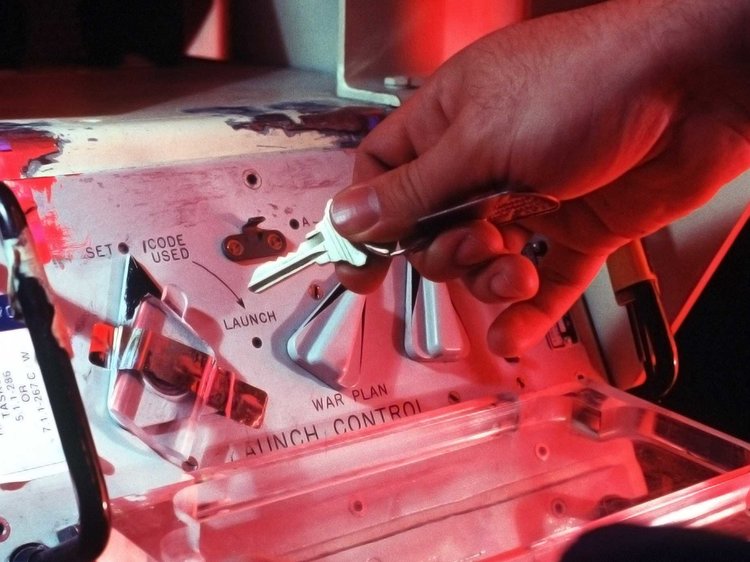I’m surprised. I though it was a Clinton. More like a McGovern.
That’s why I voted for Army of Shadows. I bet I will like it less than L.A. Confidential, which is great. But I have seen L.A. Confidential, so.
I have not, however.
Also for some reason this tread wasn’t tracked. I told you to track it Discourse!
The Polls have closed. Navaronegun News Network is calling this race early, based on exit polling. Army of Shadows is the winner with 70% of the vote in a landslide that has swept Qt3 Nation.

L.A. Confidential on election night.
The Winner!
Army of Shadows - @anonymgeist and @Rock8man
The Thread will now stay spoiler-free until Sunday 20 January, 2018 at 2359 EST. This gives everyone 10 days to watch the film. After that time discussion to include spoilers will begin. As well, the Three Stooges will submit impressions/comments/reviews after that date.
The spoiler discussion time has begun. So I’ll try to stay away from the thread until I get a chance to see the movie. I thought I’d have an opportunity this weekend, but it didn’t pan out. I’ll see it this week sometime and avoid the thread until then.
Have at it people!
Thanks @Rock8man! I had somehow convinced myself that spoilers ended tonight at 2359!
Spoliers Allowed! Weapons are free!
It had been 30 years since the last time I watched the movie, when I was a kid. Needless to say, I didn’t enjoy it back then, and I wasn’t really looking forward to seeing it again.
The representation of each member of the network’s ultimate loneliness through the crafted film-making is incredible.
And what an amazing depiction of the fearful randomness of totalitarism.
What a movie.
Finally watched it. It was everything is hoped for, but I have to go to bed.
I watched it with my girlfriend’s mother, and she hated the downer ending. I thought it was great. I love how considered the pace was, how real everything (well, except the Blitz scene) looked, how many ugly people there were, how much they didn’t belabor things that would take up 30 seconds of asinine dialogue in a modern film on the same subject. A+, would subject someone who likes happy endings to it again.
Army of Shadows pulls off a neat trick in that it’s at once a movie that’s expansive and tells the story of the French Resistance during an extended period of the War, and yet at the same it’s essentially a movie about the quiet moments where the audience and the characters sit and wait with their thoughts, wondering what’s going to happen next.
The overall story of the Resistance is a bit of a downer, isn’t it? These are brave men and women, doing what they can, getting word out to the British, being part of the overall war effort. But inevitably they will all get captured one way or another. The one time the movie really fooled me is when one of the characters we care for is taken prisoner by the Gestapo, and another loved character turns himself in so that he can be on the inside to help him out, while the rest of the Resistance cell plans his escape. At that moment I honestly thought this was going to turn into a heist movie. I should have known better. As exhilarating as Army of Shadows can be sometimes, it never stops being bleak.
So then why couldn’t I take my eyes off this movie? What made it so riveting? It’s those quiet moments where the movie sits and breathes and puts us in the situation with Phillipe. Did his fellow prison inmate betray him on the eve of their planned escape? Well, he’s sitting with him in the room now in a Gestapo office, and Phillipe has told him to run when he distracts the guard. Will he do it? What if he’s a traitor? Will he give up Phillipe? The guard has a machine gun and stands there, not 6 feet from them. They look at the guard. They sneak a glance at each other. The guard looks straight ahead. Phillipe has to ask the guard a question right? Then his communist friend/traitor can run. But he just sits there. And he stares at the guard. The guard stares straight ahead. His communist friend sneaks a glance. Is he a traitor? Is he going to do something? Is he just waiting for Phillipe to distract the guard? Phillipe stares at the guard. The guard stares straight ahead, not looking at either prisoner. They’re not in a cell. They’re just in a waiting area. Someone is likely filling out paperwork and they’ll get transferred to a more permanent office soon. Why is Phillipe waiting so long? Is his communist friend going to betray him? Did he betray him already? Is that why he’s here? Didn’t Phillipe say he was going to distract the guard? Why hasn’t he done it yet? Is he leary of his friend? Is he just summoning the courage? What do they even have on him? Maybe he just wait it out. The guard is staring straight ahead. Then Phillipe gets up and asks the guard a question and stabs him in the eye. His friend runs, and Phillipe is out of the building and running as fast as his legs can take him.
That’s what this movie is about. It happens again and again. It makes you wait. It makes you look at the surroundings with the characters. It makes you sit and wait and think. And think. And think. And think. And then it happens, and you’re primed for it. I loved that about this movie. Sometimes it spares you the trouble of trying to guess what the characters are thinking. Phillipe’s voice-over is heard as you hear his thoughts. When he’s captured again, you hear him contemplate how it’s best not to think about death. You can’t help but be afraid of it. But if you can just distract your mind and not think about death up until the moment it actually happens, you can stop from being afraid of it. And that’s what I did when I watched this movie, to stop thinking about the dead characters and the torture, and the potential death. I looked at the beautifully shot solemn solid prison doors. This can’t be a set. They must have filmed this in a real former prison. I looked at the beautifully dull colors befitting this bleak film and admired how it made Paris and Marseilles feel so solemn, majestic and at the same time vulnerable. I distracted myself with the dour imagery as the characters slowly died off.
I do almost feel a kind of resentment at the end. I mean, they won the war. So why did this movie insist on being so grim at the end even in the denouement with its remaining fictional characters? Right there in written text, it gave you a written summary of how the remaining characters died. It’s almost as if the movie was obstinate in its insistence this movie shall be dire, and death will come for all.
I don’t have much to say on top of this.
The Frecnh Résistance’s history is a mess to sort, one of many that will probably never be sorted. One relatively admitted fact is that the Résistance’s numbers probably grew vastly during 1944, and the movie takes place long before that.
The sword of Germany’s totalitarism helped by the Frecnh state meant a lot of people got deported (besides of course nationality or religous concerns: some were resistants, a lot were not, as is depicted in the first scene of the movie), very few of which made it back. On top of that were the other atrocities, committed directly on Frecnh soil.
I think the movie is very smart, pointing slightly at what it meant to oppose the Nazi regime early in the war with that bleak ending, while not pointing directly at a side of History France still cannot deal properly with — it’s very hard for a country or, I guess, most of us, to acknowledge the human nature is to not do anything, in one sense of the other, most of the time.
I was convinced for about two solid screen minutes afterward that Philippe’s escape from the machinegun was another instance of An Occurrence at Owl Creek Bridge. It just seemed too convenient and reminded me too much of the end of Brazil , but nope, turned out to be real.
So, I was approaching this month’s comments with a bit of trepidation because I had already done a pretty exhaustive write-up of this one when I last viewed it in the “War Films” thread.
So I want to elaborate on two points/observations others have made.
First of all, this is what I was going to rhapsodize about deeply. This scene.
It really sums up what makes this film so taut, almost frighteningly so. Literally frightening as you watch it.
Because Philippe, your view to the narrative, can’t really trust or believe anyone or anything, neither can you. So every second that ticks on that clock in the waiting room means more possibilities pop into your head. More questions. More doubt. About everything; his colleague, their purpose there, what could happen.
It even continues into the barbershop later. Is the Barber going to turn him in? Will the
Gestapo bust in the room any second?
Which leads to this.
I made the same reference and even cited it. Because, the escape is so damned implausible given the granite-cold clockwork of the lack of the usual “heroic moment” to bail anyone out of any situation in this film, so contrary to what we see in every action film, suspense film, etc. It runs so counter to the logic of this world, that I immediately thought “this is a dream in the moment of death”, and just stayed in shock for a few minutes when it turned out not to be the case.
I really can’t ladle any other superlatives on this film. It is a unique masterpiece. What else is there to say?
Thanks for the link and the write up. I stopped reading that thread about a dozen posts since I’d never heard of any of the movies in it, so I had nothing to contribute or get from it.
Until now!
I found the wikipedia entry interesting for this movie since it mentions that this movie didn’t come out in the United States until 2006. And it was on a lot of critics’ list for best movie of 2006! And I can totally see why. Even in 2019, I bet this will be one of the best movies I’ll see this year.
The other interesting thing in that wikipedia entry for this movie is that it got a bad reception at the time of its release in 1969 in France because the French were occupying Algeria and were facing a resistance there. That’s interesting in itself, if you view this through the prism not of World War 2, but of the Germans representing the French in Algeria. From the few things I’d heard the French were really brutal occupiers, maybe more so than the Germans during WW2.
I don’t even know where to begin.
Maybe by the simple fact that Algeria gained its independance in 1962.
(editing out my rant against Wikipedia, I have issues with that site ;)
I just realized what I will nominate next month. It deals with Algeria, in fact.
And is directed by Gillo Pontecorvo?
Maybe…
My apologies, it looks like my cursory reading of this paragraph and not following the links in it led to my misunderstanding.


